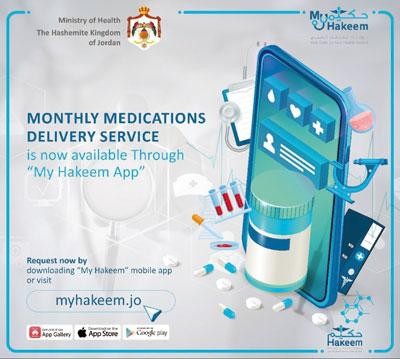You are here
E-health programme brings patient records online
By Khetam Malkawi - Oct 15,2016 - Last updated at Oct 15,2016
AMMAN — The health records of over 3 million Jordanians are now accessible in any public or military health facility connected to the e-health programme “Hakeem”.
Electronic Health Solutions (EHS), the company which is implementing the programme, said almost 50 per cent of the Kingdom’s public and military health facilities are currently connected to Hakeem.
EHS CEO Feras Kamal said 100 hospitals and primary and comprehensive healthcare centres are currently connected to the system, and that two major hospitals — Al Bashir Hospital and King Hussein Medical Centre — will be automated in the middle of next year.
The vision behind the Hakeem programme, launched in October 2009, is to create a database of patients’ medical histories across the Kingdom, including all the tests, procedures and surgeries they undergo, in addition to the diseases they suffer from, their allergies, the medications they take and other health information.
The project, which was launched under the patronage of His Majesty King Abdullah and first implemented at Prince Hamzah Hospital, is expected to be complete by the end of 2020.
“Our focus is on hospitals and the comprehensive health centres,” said Kamal, adding that 91 of the connected facilities are affiliated with the Health Ministry and seven are military facilities.
“What we are looking for is doing major clinical transformations to the hospitals… not only the implementation of the programmes, but also to let people start thinking they have to adopt to the change,” Kamal said in a recent interview with The Jordan Times.
He explains that the availability of patients’ full medical records on the system increases their safety, as all information related to them can be accessed electronically at anytime by service providers.
EHS has also developed a mobile application, where doctors in the facilities connected to the nationwide programme can access patient’s data anytime and from anywhere.
Today, “we have 200 doctors who have already downloaded the app”, Kamal said, noting that the app is secure.
The EHS is also working on the Electronic Library of Medicine to improve the efficiency of Jordan’s healthcare system.
The library aims to provide healthcare workers and medical students in Jordan with electronic, up-to-date, evidence-based and free medical information, and to bridge the gap between patient care in urban and rural parts of Jordan.
Kamal said EHS had also signed memoranda of understanding with several Jordanian universities which “allow us to have Hakeem labs in these universities for students to practise in order to prepare them for future jobs”.
One of the challenges facing the programme, seven years since its introduction in Jordan, is the availability of resources from beneficiaries and partners, he explained.
“They have an issue in the number of resources… The turnover is sometimes an issue for a programme like that, as we train staff and they leave after sometime, and it takes time to train others.”
To address this challenge, EHS is working to form “health information committees” at health facilities to train new staff.
Related Articles
AMMAN — The government on Monday signed a five-year framework agreement with the Electronic Health Solutions Company (EHS) to regulate the i
AMMAN — The “My Hakeem” medication delivery service has added six new health institutions to its platform. “A total of 10 of the Minist
AMMAN — Jordan and Algeria on Monday held talks focused on enhancing cooperation in multiple fields to follow up on the outcomes of His Maje



















